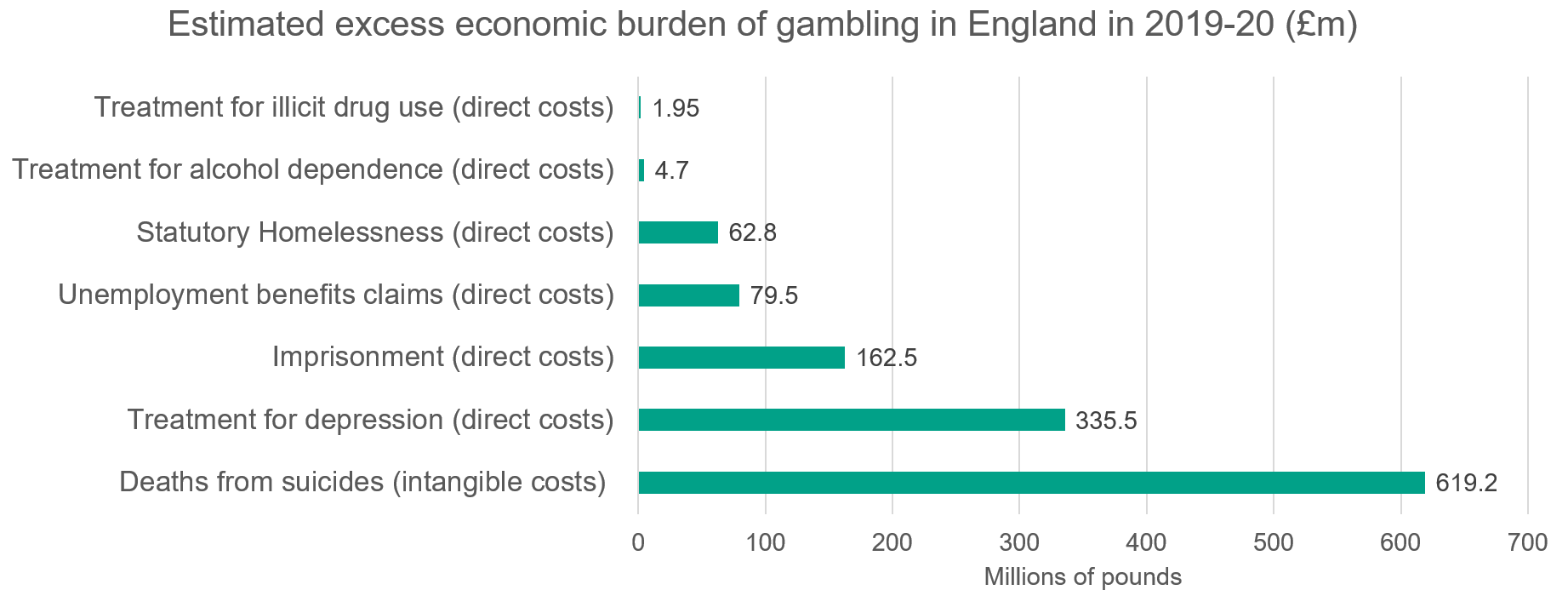The UK has one of the biggest and most liberalised gambling markets in the world. The gambling industry made £14.2 billion in profit in 2020 in Great Britain. Concern about the harms from gambling has been growing in recent years. Like other public health issues, such as alcohol, gambling can lead to a wide range of harms not only to the gambler themselves, but also to their family and friends, and wider society.
The public health community, people with lived experience of gambling related harms and parliamentarians have all called for a population level approach to deal with this public health issue. This means different stakeholders working together, for example through policy or regulation, to limit the potential harm from gambling products and environments.
We first needed a greater understanding of the gambling population in England. We wanted to know:
- who is participating in gambling
- what the risk factors for harmful gambling are
- who is experiencing harms from gambling
- what kind of harms are people experiencing
To address this, Public Health England (PHE) published an evidence review of existing quantitative and qualitative evidence in September 2021. The main findings from this review were as follows.
The gambling population in England
Using data from the Health Survey for England (HSE) and other sources, we estimated that 24.5 million adults gambled in 2018. That’s 54% of the adult population. We found that apart from people who buy lottery tickets, which has seen a 10% reduction in the last 8 years, participation in all other forms of gambling has remained stable since 2012. However, online gambling has increased.Harmful gambling is experienced along a spectrum, which is often categorised by the Problem Gambling Severity Index (PGSI) as:
- low risk gambler: gamblers who experience a low level of problems with few or no identified negative consequences
- moderate risk gambler: gamblers who experience a moderate level of problems leading to some negative consequences
- problem gambler: gamblers who gamble with negative consequences and a possible loss of control
The proportion of people experiencing ‘problem gambling’ has remained relatively stable since 2012, while the proportion of ‘at risk’ gamblers has seen an increase.
People who experience harms from gambling tend to have higher participation in online gambling. Overall, participation in online gambling by ‘at risk’ gamblers (23.4%) was more than double that of the general population (9.4%) in 2018.
There are marked socioeconomic and health inequalities in the profile of gamblers. ‘At risk’ and ‘problem gambling’ are associated with:
- being unemployed
- living in more deprived areas
- poor health
- poor life satisfaction
- disproportionately younger men
Drinking alcohol is also strongly associated with harmful gambling, as is having a mental health issue.
There are also geographical disparities in people experiencing harm from gambling. In 2018, the North East had the highest overall participation in gambling (64.7%) and the North East (4.9%) and North West (4.4%) had the highest prevalence of ‘at risk’ gambling.
We also looked at gambling participation and harm during the pandemic (based on data published before October 2020). While there was an overall reduction in gambling during the first UK lockdown in March 2020, frequent gamblers (those who gambled once a fortnight or more) tended to gamble the same amount or more during lockdown. People who increased their gambling activity during lockdown were most likely to be people who were experiencing harmful gambling before lockdown. They were also more likely to be male and younger in age.
The HSE does not include questions on children, or on affected others. Looking at other data sources, we found that the proportion of children who take part in any form of gambling has been decreasing since 2011. Currently, the rates of gambling among children and young people are lower than drinking alcohol, but they are higher than using e-cigarettes, smoking tobacco cigarettes, or taking illegal drugs.
We also found evidence from a YouGov survey that around 7% of the population of Great Britain (adults and children) were negatively affected by someone else’s gambling.
Risk factors for harmful gambling
We carried out a review of systematic reviews to find the main risk factors for future harmful gambling among children and young people.
We have confidence that the following are risk factors:
- impulsivity
- substance use (alcohol, tobacco, cannabis, other illegal drugs)
- being male
- being depressed
- participating in gambling activities
- already having a problem with gambling
- anti-social behaviour
- violence
- poor academic performance
- having peers who gamble
We also have high confidence that the following are not risk factors for future harmful gambling among children and young people:
- psychological distress
- suicidal ideation
- money won or lost
- risk taking
The harms to individuals, families, communities, and wider societal harms associated with gambling
To explore the harms associated with gambling we undertook an abbreviated systematic review and narrative synthesis. We adapted Langham’s taxonomy of harms, which describes seven pillars of harms related to gambling, to define which harms we would include. This resulted in us looking at the following harms:
- financial
- health
- relationship
- employment and educational
- criminal
- cultural
The strongest evidence we found was for health harms, financial harms, and relationship harms. Financial harms (such as gambling related debt) affected both the gambler and their family and friends. And debt can also lead to other harms, such as relationship harms. While the evidence showed that gambling was not a direct cause of crime, there was qualitative evidence showing that gambling related debt causes some gamblers to commit crimes. Several studies reported that gambling led to housing problems, including homelessness.
Looking at health harms, we found suicidal events (attempts, ideation, and death by suicide) to be at least twice as likely among adults with gambling problems. The relationship between gambling and mental health is complex, as is the relationship between gambling and alcohol, drug, and tobacco use. They appear to be related, but it’s not clear whether gambling causes substance misuse or substance misuse leads to gambling. It's likely to be different for different people.
Gambling directly causes relationship problems that affect the gambler, their family, including children, and their friends. These problems include poorer family functioning, low social support, relationship strain and in some cases there was evidence of domestic abuse.
The impact of gambling on relationships ripples outwards from the gambler, detrimentally affecting wider family and friendship networks.
There was some evidence from qualitative studies that particular populations, such as migrants and people with learning disabilities, are at more risk of harm. Gambling may be making existing inequalities in these populations worse.
The costs to society from gambling related harms
We estimated the excess cost of harms associated with gambling to society to be £1.27 billion in 2019 to 2020 in England alone. We found that £647.2 million (51% of total cost) was excess direct cost to government in the form of:
- homelessness applications
- people experiencing depression
- alcohol dependence and drug dependence treatments
- unemployment benefit claims
- the cost of imprisonment
The remaining £619.2 million (49%) were wider societal costs associated with suicide.

This figure is much higher than previous estimates. Even still, we expect our figure is likely an underestimate as we could not cost many of the harms we identified. For example, we could not cost:
- financial harms apart from homelessness
- cultural harms
- relationship harms
- harms to affected others
This is the most comprehensive analysis of the economic burden of gambling to date, but our estimate of £1.27 billion will likely change as we get better evidence.
Stakeholders’ perspectives of gambling related harms
Through a thematic analysis of submissions to a gambling consultation and over 900 posts on Twitter (tweets), we found that non-commercial stakeholders (health and non-governmental sectors and people with lived experience) and commercial stakeholders (gambling operators and their affiliates) hold quite different viewpoints on gambling related harms.
Non-commercial stakeholders thought that harms exist in a continuum of severity experienced by individuals, families, and society. They thought any action to address wider determinants of harm and targeted support to people at risk needed a whole-system (cross government) approach. However, commercial stakeholders promoted the view that gambling related harms are only experienced by a small group of people with severe problems in need of individual-level policies and interventions.
Gaps in the research
Most studies to date have concentrated on harms to the individual gambler themselves. While we know family and friends can experience (sometimes severe) harms, so far there are relatively few studies about affected others and even fewer on societal harms.
We would benefit from more longitudinal data on risk factors and harms from gambling. This would help us to better understand the directional relationships between gambling and possible risk factors and gambling related harms. Better, causal data on a wider variety of harms would also help improve our estimates on the social and economic burden of gambling related harms.
Also, to get a clearer picture of gambling related harm and help implement interventions and policies to support people experiencing gambling related harm, we need better information on:
- time and money spent gambling
- specific harms according to gambling severity
- specific harms according to type of gambling participated in (for example, online vs. in person)
The next steps
This review has shown that gambling can lead to a wide range of long-lasting harms and that addressing them needs a public health approach. More needs to be done to prevent and reduce gambling related harms.
We will soon be publishing a Delphi study on the policies and interventions that have the most potential to prevent and reduce gambling related harm in England.
The Office for Health Improvement and Disparities (OHID) (which replaced PHE in October 2021) continues to work with other government departments to address knowledge gaps, get better gambling data and implement evidence-based interventions to prevent and reduce gambling related harms. Some initial steps include:
- working with NHS England on improving treatment provision
- commissioning research to calculate prevalence estimates of need and demand for treatment of harmful gambling (due to be published in 2023)



